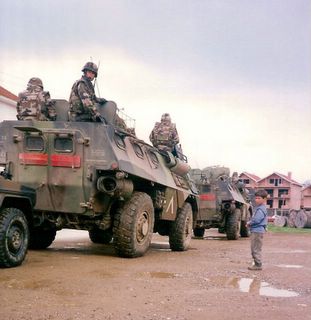
By David Abel | The Star-Ledger | 4/11/1999
PETROVIC, Macedonia -- The radio in Sgt. 1st Class James Lashelle's Humvee crackled.
"X-ray, this is Blue 5, we're taking direct fire," the voice said — calmly, almost casually. "We're in contact. They're all over us."
The message came during a routine patrol for Lashelle of Clinton, Iowa, and his company. The American soldiers had been patrolling the rocky border between Serbia and Macedonia for several weeks.
When the words of Staff Sgt. Christopher Stone, a 25-year-old father from Smiths Creek, Mich., came across the radio, the platoon sergeant thought his gunner was joking. "I didn't hear the edginess in his voice," Lashelle, who was cruising through the brush about three miles away, said last week. "But I should have known. Sergeant Stone would not have made a joke like that."
In 30 seconds, the radio had gone dead. Stone and two other cavalry scouts, Staff Sgt. Andrew Ramirez, 24, of Los Angeles, and Spc. Steven Gonzales, 24, of Huntsville, Texas, were gone. The trio from the 1st Squadron, 4th Cavalry of 1st Infantry Division had been snatched by the Serbs.
"I was very frustrated," Lashelle said in an interview Wednesday. He and other Americans here talked about losing three comrades and what it is like to be a part of an action that started as a peacekeeping mission and is now is military one.
Lashelle and the missing men came to Macedonia from their home base in Schweinfurt, Germany. Like U.S. soldiers before them, they thought they were going to be U.N. peacekeepers. Instead, they became part of a NATO force.
The U.S. presence is not welcomed by ethnic Serbs who live along the border in Macedonia. While the ethnic Albanians who have been expelled from Kosovo appreciate their help, many in Macedonia don't.
Sgt. Ronald Hintay, 29, of San Diego, feels the pressure. This is his second tour in Macedonia. In 1995, he remembers locals smiled and waved as his convoy passed. Then, their Humvees were painted white and their helmets were blue, signifying their relationship with the United Nations. Even when NATO launched a month-long bombing campaign against the Bosnian-Serb forces later that year, the border remained quiet, Hintay said.
Conditions along the border, especially in ethnic Serbian areas within Macedonia, began to change when the United Nations mission ended in February. The bitterness has only increased since NATO began its bombing campaign March 24.
Now, at least 12,000 NATO troops have replaced the U.N. soldiers, which include about 500 U.S. soldiers, up from 350 when it was a U.N. operation. The blues and whites have been painted green. And there is more firepower.
"It's really become a hostile environment," Hintay said. "Soldiers used to marry locals and go downtown all the time. Now, you can't go there . . . It makes me disappointed. We're trying to help this country."
Some of the newly arrived U.S. soldiers are just confused.
Spc. Rachel Dawson, 20, of Cleveland, arrived in Camp Long here in Macedonia little more than a week ago from the 504th Brigade's base in Fort Hood, Texas. Taking a water break, Dawson, one of the few American women serving here, confessed she had little idea what the war was about.
"Really, I don't know why we're bombing Serbia," she said. "I just know what I hear on CNN. Someone's trying to get some land. I don't know."
Other soldiers said they understood the tension. They know they may be among the vanguard likely to push into Kosovo, whether as peacekeepers or as an invading force.
"The Serbians are killing the ethnic Albanians, and we're here to stop it because they're committing crimes against humanity," said Spc. Damon Harris, 26, of Springfield, Mo. When asked if he worried about an invasion, he answered, "Mine is not to ask who or why, but to do or die."
For now, American soldiers in Macedonia are patrolling the border. But there is evidence everywhere that their role has changed. When they were part of a U.N. peacekeeping mission, they flew flags and advertised their presence. Then they were observers.
Not now. Now they're a military force with an enemy.
Beefed-up patrols move surreptitiously along the border. Soldiers carry more ammunition and are required always to carry weapons and protective vests. They're also authorized to use deadly force if attacked.
"Everyone is very concerned about retribution," said Lt. Col. Jim Shufelt, commander of the U.S. forces here. "It's possible we can be shelled or there can be a terrorist attack. Anything is possible."
Like more soldiers being captured by the Serbs. Shufelt is adamant that Stone's patrol didn't cross the border as the Serbs say. He believes the patrol was ambushed in Macedonia.

